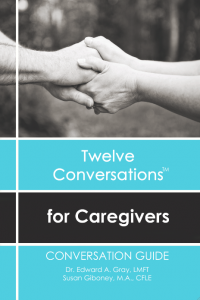12 Conversations for Caregivers
Relationships are the foundation for love, support, and caregiving. Walking an extended healthcare journey may bring out the best and the worst in us and our loved ones. Relationships are blessed. Relationships are torn apart.
Caregiving may be well orchestrated. Caregiving may be intensely chaotic. We may direct the care well, and at other times we are directed by chaos and circumstances beyond our control.
Flooding emotions are the norm: love, frustrations, hope, despair, gratefulness, resentment, energy, fatigue, confidence, confusion, fear, courage, calm, and desperation only begin to describe the journey.
The diagnosis is a “not-so-silent” silent partner in our lives. It screams for our attention. It becomes the focal point of living, yet it may be the harbinger of death. It may bring us closer together in our love, or it may rob us of our joy.
Giving and receiving support is an essential part of self-care for caregivers. There is a danger that caregivers may become socially isolated. Staying connected to people who understand you and care about you is vital for your well being.
In these twelve conversations for caregivers, you will have opportunities to share with others who are also on their caregiving journeys. Each conversation topic provides a loosely structured format with questions that encourage you to share your experiences. These conversations may occur in a small group or simply between two caregivers.
You will learn from the stories of others that you are not alone. You will bond with others who are walking this journey. You will give and receive strength as you juggle the many demands on your life.
Conversation 1: Life Before the Diagnosis
Conversation 2: Beginning the Journey
Conversation 3: Physical Challenges of Caregiving
Conversation 4: Your Medical Team
Conversation 5: Relationship Roles
Conversation 6: Support Networks
Conversation 7: Managing Outcomes
Conversation 8: Legal and Financial Matters
Conversation 9: Self-Care for the Caregiver
Conversation 10: Community
Conversation 11: Planning for the Future
Conversation 12: If You Are Saying Goodbye
Sample Conversation:
Conversation 1 – Life Before the Diagnosis
Consider:
“There are only four kinds of people in the world- those who have been caregivers, those who are currently caregivers, those who will be caregivers, and those who will need caregivers.” -Rosalynn Carter
“The art of living is to die young as late as possible.” -William Coffin
An unpaid army of 44.5 million is caring for our ailing adults.
Our culture must change the way the ill or elderly are viewed.
It is a challenge to meet the needs of the patient while not neglecting the needs of other family members.
For married couples, caregiving addresses the marriage vow covenant of “in sickness and in health.”
Caregiving is not always altruistic, because it can be considered burdensome to care for an “unloved” one.
Caregiving takes different forms from short to long term, from children to elders, from special needs to the disabled, but it always requires a response.
“When people grow older, get sick or die, their formerly robust lives are often forgotten. To be forgotten is something we all fear. It is why we make an effort to leave a legacy.” -Gail Sheehy
From Caregivers . . .
“I never wanted to think we would be walking this journey together. We have such a different view now. Time together is what matters most. I love the way we hold and touch each other.”
“Each day is a new gift. We need to be intentional about our choices for our time.”
“This is harder and even sadder than I thought it would be.”
Questions for Sharing
- What are some of your memories of life together?
- How would you describe your relationship through the years?
- What difficulties have you faced together?
- What is one special thing your loved one has done for you?
- What have you enjoyed doing together?
- How has your relationship grown and changed over the years?
- What brings you joy and happiness in your life?
- What travels or other activities have you enjoyed?
- How are you balancing “life now” as compared to your life before the diagnosis?
- When did you first learn of the medical issues you are both facing?
- What caregiving experiences have you provided in the past? How is this similar or different?
- How are you juggling your multiple roles in life along with this new role of caregiver?
A Step Beyond the Conversation
Get your photographs out. Review a timeline of your life. Reminisce about your lives and share some of your favorite memories, activities, events, stories, or songs. Make a list of them and with whom you would like to share your stories.

